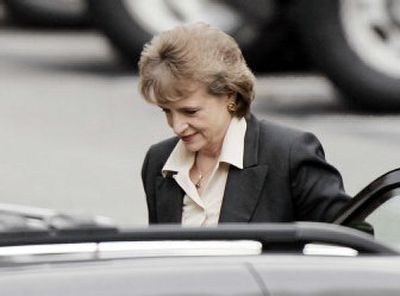Miers facing questioning about policy on detainees

WASHINGTON – The chairman of the Senate Judiciary Committee warned Supreme Court nominee Harriet Miers Wednesday that he intends during confirmation hearings to probe her views of the Bush administration’s detention of suspected terrorists in the military prison at Guantanamo Bay, Cuba, making clear he remains uncertain of her command of complex constitutional issues.
Chairman Arlen Specter, R-Pa., dispatched a letter to Miers, the White House’s top lawyer, saying that she must also convince the Senate that as a justice she would be independent of President Bush and would not give him “any special deference” on cases before the court.
In particular, Specter said, he will press her to disclose her personal views of three recent Supreme Court rulings that detainees in the terrorism fight have somewhat greater rights than the administration has wanted to give them.
The new pressure from Specter, who will preside over the hearings that are to begin on Nov. 7, came as Republican senators and conservative groups voicing qualms about the Miers nomination grew louder. Her visits to senators on and off the judiciary panel are so far failing to win commitments of support, senators and their aides said.
Adding to Miers’ burden, some opinion leaders and grass-roots organizations on the right said Wednesday that they are troubled by her writings and speeches from a short-lived political career in Dallas and years as a leader of Texas’s legal community. Disclosure this week of some of Miers’ words from the 1990s suggest a liberal tinge and inconsistent thinking on social issues, they said.
Sen. David Vitter, R-La., emerged from a meeting with Miers Wednesday to say that he was uncertain whether he could support her. Calling her engaging, Vitter said in a statement, “My central question still remains to be answered, however: Is there objective, written evidence from prior to her nomination that fully shows that she has a truly consistent and well-grounded conservative judicial philosophy?”
At least two conservative groups, which had taken a neutral position on Miers, called on her to withdraw Wednesday, after the Washington Post published decade-old speeches. In one such speech, to a Dallas women’s group in 1993, Miers said that “self-determination,” not government, should guide the outcome of issues such as abortion and school prayer when law and religious beliefs collide in court. Those statements differed from the opinion Miers had expressed four years earlier when, as a candidate for the Dallas City Council, she told an anti-abortion group that she would support a constitutional amendment to ban the procedure, except to save a woman’s life.
One of the new critics, M. Edward Whelan III, president of the Ethics and Public Policy Center, posted a memo on the Web saying, “Her comments reflect such a profound confusion, and such an inattention to the respective roles of the courts and the political branches, that they call seriously into question her fitness for the Supreme Court.” And echoing the call for her to withdraw, Wendy Wright, executive vice president of Concerned Women for America, said, “Every time she quotes or cites women she admires, they’re to the left of Betty Friedan.”
The controversy over Miers’ old words came as Specter and the judiciary committee’s ranking Democrat, Patrick J. Leahy, D-Vt., awaited a reply from the nominee, due Wednesday, to a revised questionnaire about her background views. They denounced original answers Miers turned in last week as inadequate.
In particular, they asked for more detail about the role she has played in handling constitutional issues since becoming White House counsel last winter. Congressional and White House aides said they expected her new reply by midnight.